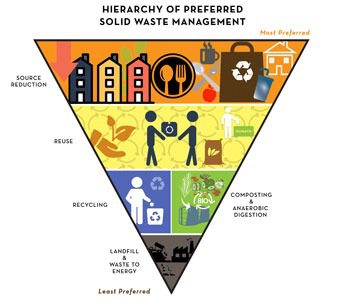Zero Waste International Alliance defines the term Zero Waste as “the conservation of all resources by means of responsible production, consumption, reuse, and recovery of products, packaging, and materials without burning and with no discharges to land, water, or air that threaten the environment or human health”.
Most of us look at that definition, or any such declaration, and are defeated before we even have a chance to figure out what it means. We are surrounded by disposable and single-use products, appliances and household items that cost more to repair than to replace, fast fashion that is cheap but wears out after a couple of washes, over-packaged food, and plastics everywhere. Have you stood at the recycling box recently wondering if the thing in your hand goes into recycling or garbage? Or wondered how much of what you’ve put into your recycling box actually gets recycled. It’s truly overwhelming.
There are small things that you can do, that do add up, especially if many people are doing them. Yes, drastic measures are required to address climate change, but small changes do make a difference. We can all make small changes, or swaps, in our everyday lives, to change one or two small things for something that generates less waste. Yes, Ontario’s plan for recycling intends to put the responsibility for recycling at the feet of the producers in the next few years. No one quite knows what this will look like though. Will producers truly take over responsibility for recycling, or will they just add cost onto their product, and pay the municipalities or waste companies?
Meanwhile, if we want to make changes in our lives to move towards a more Zero Waste lifestyle, a good approach is to avoid creating a demand for more production. Reduce. Reuse. Recycle. Recycle is third on the list. We need to reduce our demand, and reuse what we already have. The world doesn’t need more garbage. Here are some things that you can try. Some will be way beyond your comfort level now. Just try to do a few, perhaps. The idea behind a zero waste swap is that you replace one thing in your life with something more sustainable. As you keep making swaps, it becomes easier.
Straws are of course the poster child for how single-use plastics are killing wildlife. Try not to use straws unless you absolutely must. Then try to use re-usable ones, or those made of paper. Use up what you have before you go out and buy all new green, environmentally friendly products. It is against the entire concept of Zero Waste to throw out all your old things, with plenty of life left in them, in order to replace them with greener alternatives. Use things until they fall apart if possible. When you absolutely have to replace something, then replace it with a greener, more environmentally-friendly item. Buy things that will last. Source second hand items, whenever possible and practical, but also buy the best quality you can when you do buy new, so that it will last. Shop less in general. Ask yourself if you really need it before you buy it. Swap clothes with friends. Fix or mend things if you can. Give yourself a 30 day no-shopping challenge. Try refillable pens or recycled paper. Choose second hand electronics. Share books, or borrow from the library or read off a device if you want to support the author. Giftwrap in re-usable fabric.
Don’t use single-use plastic bags. Bring re-usable bags with you when you shop. Put something at your front door, or on your car dash, to remind you to bring the bags with you. Take re-usable produce bags too. They can be fancy mesh ones with draw strings and toggles, or they can be basic home-made ones.
When you do go out, bring your own cutlery to use rather than plastic forks. Bring a mug with you for coffee. It doesn’t have to be fancy, or expensive. Use up what you have. Carry your refillable water bottle. Try to brown bag your lunch and snacks when you can. You will save a bit of money, and possibly eat more healthily. Make some of your favourite snacks at home. Swap your single-use napkins for re-usable. Don’t use plastic wrap. At home, cover left-overs in a pot or bowl with a dinner plate, or a beeswax wrap.
Save your citrus peels and soak them in vinegar. Use that to wash counters or clean. Vinegar is a great cleaning agent, as is baking soda. DIY toilet tabs work. Swap your laundry detergent for refillable, or use concentrated laundry cream sold in mason jars. Use natural stain sticks. Swap your plastic kitchen brushes and scrubbers for those made of sustainable materials. Use bar soap or laundry cream for laundry. Try soap nuts.
Save your veggie scraps and make stock. Grow herbs rather than buying them in the produce isle. Make plant milks yourself if you drink them. Use charcoal filters for water rather than buying bottles. Aim for carbon neutral or carbon negative food and materials. Consider how many miles your food has to travel to get to you. Buy local and seasonable when possible. Choose hemp over cotton. Use jars you have already to store bulk items, before you go out and buy new mason jars. Switch to loose-leaf teas and herbal teas. Don’t throw out food waste. It doesn’t decompose in the landfill, and contributes to greenhouse gasses. Try making things like breads, buns, or flatbreads.
Swap your shampoo and conditioner bottles for bars. Use bar soap. Try a re-usable razor. Try re-usable menstrual pads, cups, and period panties. Consider a bidet. Swap out tissues for reusable handkerchiefs. Buy toothpaste and deodorant from a sustainable company. Try a DIY lipbalm or one in reusable or sustainable packaging. Swap your plastic toothbrush for one that is made of more sustainable materials, once your old one is done. Say no to online companies that do not package or ship in an environmentally conscious fashion.
These may seem small. Some won’t work for you. There are probably many swap suggestions that aren’t here. Currently North Dundas is undertaking an Environmental Assessment in regards to waste management. All municipalities are facing increased pressure to find new approaches to deal with waste, recycling, organics, and landfills reaching capacity.




